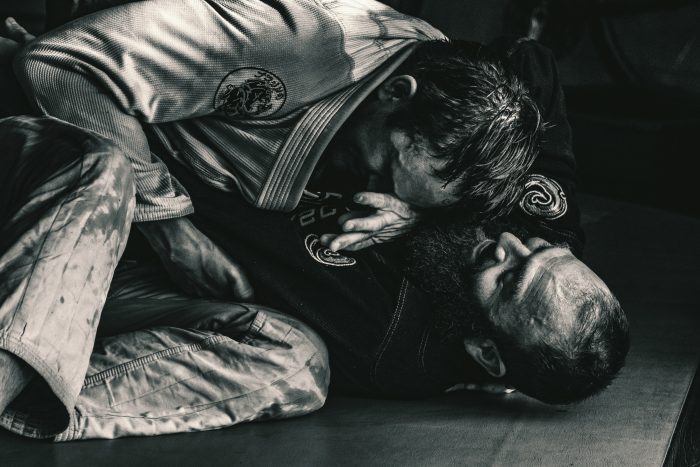Every life has conflict in it, and two principles from the martial arts, kime and ma, can help us avoid feeling that life is an exhausting battle.
Conflict doesn’t have to define our relationships with other people who are often difficult, contentious, or determined to conquer or dominate us. Life is too short to let tense situations and aggressive people get the better of us.
Kime (key-may) means focus: the right force, at the right place, at the right time. It involves being “loose, loose, tight, loose”—remaining loose except in those moments when you need to put forth a concentrated effort. In karate or judo, kime is the moment of a focused kick, punch, strike, or throw. In a conversation with someone who is being too forceful, kime is the moment in which we set a firm boundary, speak our truth, or take some other action rooted in clarity and purpose.
When dealing with a challenging person, it’s best to remain loose and listen. We need to consider their perspective and personal experiences while we remain relaxed and attentive while observing them.
What is this person’s body language conveying?
If we start becoming irritated or frustrated, we can breathe deeply, allowing our nervous system to be on alert but not hijacked by an intense “fight or flight” response that can overwhelm us with anger. Should our muscles tense up, we can consciously relax them. The goal is to have clarity and energy available to us when we recognize that it’s time for us to speak. Remaining loose lets us move smoothly and quickly when we assert ourselves. In contrast, remaining tight, with our muscles tense, while waiting for our chance to win by taking a strong action will tire us out. It’s best to not lose our cool as we wait for the right time to speak, trusting that we will find the right words to use.
Of course, we don’t want to miss our chance to make our point. We have to be sure not to remain loose for so long that we passively retreat or give in without speaking up or taking needed action. Otherwise, we might find that often, difficult people will take advantage of us.
Ma is a strong partner for kime when it comes to martial arts wisdom, one that we can use in our everyday lives. Ma is the principle of right distance: not too close, not too far. If a competitor is too close to someone with whom they are sparring in a karate or judo match, their action will be restricted and won’t have full impact. If the competitor is too far away, they won’t be able to reach their opponent to make a strong impact on them. Similarly, if we’re too close to a situation emotionally, it can cause problems.
Let’s say that a person is attached to having a particular relative speak to them respectfully but feels that his relative habitually disrespects him. If this individual doesn’t practice ma, his emotions might get the better of him. He might lose objectivity and struggle in vain to deal with the situation effectively when his relative begins raising her voice. Being too close to the situation emotionally and becoming angry can make it hard to think clearly or come up with a win-win solution. However, what if the relative meant no disrespect?
Now, if we’re too far away from our emotions and another person’s, we’re not practicing ma. Then we can lose our ability to be empathetic toward that other person when they are upset. We might too quickly dismiss their feelings and desires, thinking only of ourselves and our need for quiet and a lack of drama. It becomes difficult to achieve a compassionate resolution to a conflict.
To have more productive conflicts, we can ask ourselves whether there are places where we are too tight—too on edge. We can try to identify situations in which we have a hard time controlling our emotions. We can think about whether we are not seeing someone’s behavior clearly because we are too upset by them or too impatient.
We can also remember to be more sensitive to other people’s feelings, listening attentively instead of interrupting them. Our remaining “above the drama” can upset them, making it hard for them to focus on finding common ground with us. Allowing them to express their emotions might not be as stressful as we might think it will be. I have discovered that sometimes, people just want to be heard and listened to long enough to feel that they are valued. Then, they shift on their own. Their emotional intensity gives way to a calmer state in which they are open to solving problems and listening to others speak. Conflicts with them can be less painful and more likely to have a good outcome.
Sometimes, people avoid conflict altogether, figuring that that’s the easiest and safest choice. However, this attitude can lead to feeling drained, powerless, and defeated.
All relationships involve clashes at times, and when people work at conflict resolution using martial arts wisdom, it can lead to greater trust, deeper emotional intimacy, and stronger partnerships.
Leaning into a difficult situation and practicing kime and ma can help anyone to better handle disagreements with other people and develop effective solutions to problems.












Read 0 comments and reply